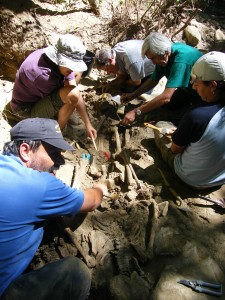Archaeology and memory in Spain

Exhumation by the Association for the Recovery of the Historical Memory (ARMH). Archivo fotográfico Foro Cultural Provincia de El Bierzo. CC BY-SA 3.0
This is an abstract of Ashley Ellington’s winning essay in the Graduate Student category of the 2014 George Watt Memorial Essay Contest. Read the entire paper here.
Following the Spanish Civil War, the victorious dictator Francisco Franco used archaeology to legitimate his power as well as the official history of the war. Today, many Spanish people are working to change the official history to include those who the Franco regime erased or demonized. In modern times there has been a movement to have a more inclusive historical memory. Using different types of archeology, such as exhumations and excavations on battlefields and labor camps, current research focuses on bringing the Spanish Republicans back into history. The evidence gathered can speak for a people who were mostly erased from both the official history and memory of the Spanish Civil War.
The Franco regime focused on memorializing the fallen from the Nationalist side of the conflict, while modern research focuses almost exclusively on the Spanish Republicans. The problem facing archeologists and historians now is how to combine their findings to present a history that represents both sides of the conflict. The excavations and exhumations are helping to fix this by recovering the remains of Spanish Republicans and evidence of their fight against Franco. However, the decision of how much history to include is being left in the hands of individuals and non-government agencies for the most part. Only time will tell how the people of Spain deal with this issue, though as this paper suggests, they have started to address this old wound.
This paper was originally written for “Seminar in Archaeology: Conflict Archaeology” while pursuing a Master of Arts in History at Georgia Southern University. A version was presented at the 2013 Dr. Gregory P. Domin Graduate Research Conference at Columbus State University.












